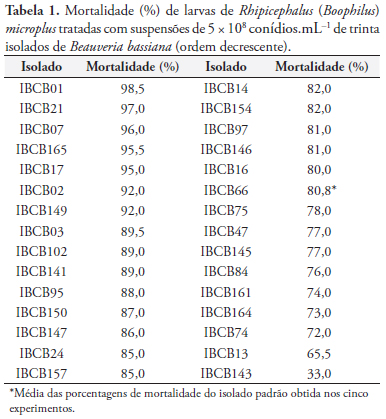This study was carried out to select isolates of the entomopathogenic fungus Beauveria bassiana with pathogenic potential to control the Rhipicephalus (Boophilus) microplus tick. The effectiveness of thirty isolates was first tested at a concentration of 5 × 10(8) conidia.mL-1. Of these, eight were evaluated (IBCB01, IBCB02, IBCB07, IBCB17, IBCB21, IBCB74, IBCB149, IBCB165) and showed an effectiveness between 90 and 99%; thirteen (IBCB03, IBCB14, IBCB16, IBCB24, IBCB95, IBCB97, IBCB102, IBCB141, IBCB146, IBCB147, IBCB150, IBCB154, IBCB157) between 80 and 89,5%; six (IBCB47, IBCB75, IBCB84, IBCB145, IBCB161, IBCB164) between 70 and 79%, and only two (IBCB13 and IBCB143) had lower pathogenicity (70% or below). In the second step of the study, the five more effective strains in the first phase of the experiment (IBCB01, IBCB07, IBCB21, IBCB66, IBCB165) were analyzed comparatively. Based on in vitro results, it can be concluded that IBCB66 and IBCB21 are the isolates with higher potential for field control of R. (B.) microplus. IBCB01, IBCB07, IBCB21, IBCB66 e IBCB165 isolates were submitted to a conidial production test using a rice-based substrate. The best mass production of the entomopathogenic fungus was obtained with the IBCB66 strain.
Tick; biological control; cattle




